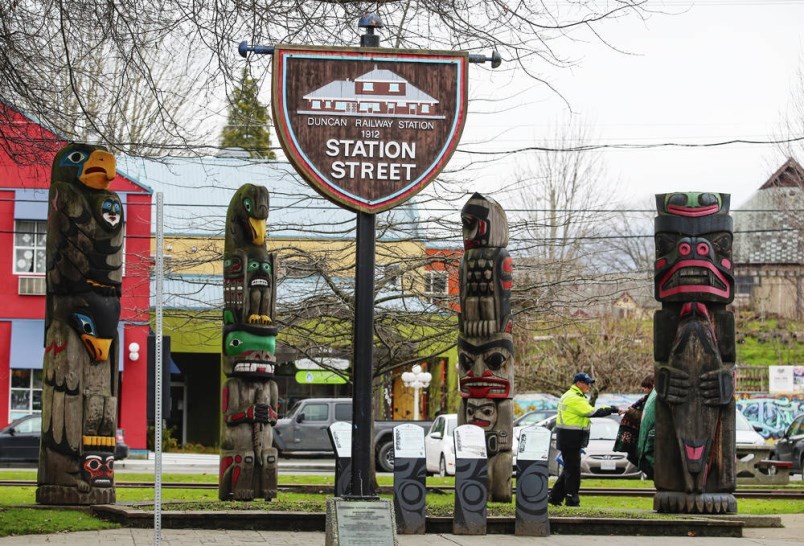It doesn’t take much for racism to rear its ugly head, as it seems to have done in the otherwise peaceful multi-ethnic, multicultural Cowichan Valley since one group within the community, the Cowichan Tribes, announced a significant incidence of COVID-19 among its members.
According to valley leaders, both Indigenous and non-Indigenous, the Cowichan Tribes’ openness resulted in the uncovering of racist attitudes and public statements that have endangered the long-term productive relationships between the non-Indigenous population and the Indigenous populations of the Cowichan Valley.
It was those positive and inclusive attitudes that resulted, in 2008, in the very successful staging of the North American Indigenous Games in the Duncan community, which welcomed Indigenous people from across North America.
Has the Cowichan Valley community cultural outlook changed so much since then?
Perhaps the answer lies in the bigger national question of whether Canadians are at risk of being drawn to messages that blame “the other.” Is there a risk of a growing hostility to immigrants and minority groups, or to voices of dissent such as those of environmental activists?
Research conducted by Michael Adams, president and co-founder of Environics, a public-opinion research and polling firm, found the answer is an unambiguous no.
Data from Environics polling indicates that because Canadians have learned more about the impact of inequality on all levels of the population, attitudes have been changing — especially about the situations of some Indigenous communities.
Those changes, especially in recent decades, include greater empathy, reflective of a more open, optimistic national personality that continues to gain strength, both in good times and during the stresses of a pandemic.
Adams, in his analysis of the Environics research, points out that Canada is becoming an increasingly difficult place for politicians selling a message of xenophobic populism, as Maxime Bernier learned in the most recent federal election, when his People’s Party failed to earn a single seat, including his own.
Apparently, one factor in the emergence of more tolerant attitudes is who Canadians are and where we live. More than a fifth of us are immigrants from a wide variety of countries. The proportion of immigrants in cities where most Canadians live has increased over the last two decades.
Racism, misogyny and xenophobia are ugly characteristics wherever and whenever they exist. Those attitudes are generally defined as based in beliefs that one race is superior to another and lead to prejudice, discrimination, even antagonism on the part of one racial or ethnic group toward another.
None of that has any basis in logic or rational thought. It’s often based on unexpressed fear of “the others” — those not like me.
Nor is racism across the world limited to white/non-white conflicts. Internal tribal racism exists in Asia, Africa, the Middle East and Europe, China and Japan, motivated by historic cultural, religious, economic or demographic differences.
Similarly, racism in Canada can be traced back to both historical inequalities as well as governmental negligence and political non-compliance with United Nations human rights standards.
Environics research reveals that a majority of Canadians embrace fairness and inclusion, but that those characteristics are not ubiquitous. There are well-publicized exceptions, both historical and contemporary, in our laws and on our streets. Nor should those exceptions be easily disregarded.
So what to do and where to start with the emergence of an unexpected local brand of racism, or any kind of racism, which Dr. Caleb Rosado of the Colorado State University Ethnic Studies Department calls “still one of the most pervasive social evils in the world.”
Rosado’s research is clear — change must begin with individuals honestly examining their own thinking and attitudes about racism.
He lists what he calls “do-ables” for unlearning racism and prejudice.
First, says Rosado, closely examine your values and beliefs. “Why do you think, believe, and behave toward others as you do? Ask yourself why do others who are different from me, either by culture or physical features, make you uncomfortable? Probe your own psyche in search of the root cause.”
Then, he advises, “go out of your way to become informed about groups or individuals with whom you have the greatest contact but about whom you know little. Remember, one of the bases of prejudice is ignorance.”
Too optimistic about the capacity of humans to learn more about each other?
Perhaps, but we have no choice. To do otherwise could lead future generations towards a Canada we now have the power to reject.
— Geoff Johnson is a former superintendent of schools. [email protected]



